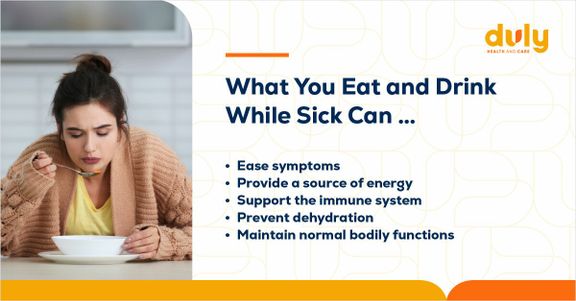Follow these tips for fueling your body when you have viral gastroenteritis:
- Let your stomach settle. Avoid eating solid foods for a few hours. Drink liquids instead, such as teas, broths, sodas, and sports drinks without caffeine.
- Hydrate. To stay hydrated, concentrate on consuming small amounts of liquid on a regular basis.
- Ease back into eating. Start eating smaller meals of bland, low-residue foods, such as mashed potatoes, plain noodles, crackers, toast, gelatin, bananas, rice, and chicken, as soon as you can handle drinking clear liquids.
- Be cautious with medications. Since over-the-counter drugs like ibuprofen can upset your stomach, it’s best to use them sparingly. To prevent any possible side effects, talk to your healthcare team about your medications. If your symptoms are severe, you might need to take an anti-nausea medication to prevent vomiting when you vomit, or an over-the-counter medication to lessen the symptoms of diarrhea.
The primary consequence of a stomach virus is dehydration, which is a significant loss of water and vital minerals and salts. By consuming enough fluids to replace those lost through vomiting or diarrhea, you can reduce your risk of becoming dehydrated.
Viral gastroenteritis symptoms typically manifest one to three days following exposure, depending on the cause. The symptoms last for a few days to a week and can be minor or severe at times.
You’ve heard about eating soup when sick or ginger when nauseous. But do they work? We’re breaking down what to eat during illness to nourish your body.
It’s likely that by now you or someone you know has experienced at least one winter illness, which can come in a variety of shapes and sizes. A number of illnesses include the common cold, the flu, RSV, pneumonia, strep throat, COVID, and norovirus (also known as the stomach bug).
When you’re sick, nutrition and hydration are essential for relieving discomfort and accelerating your healing process at any time of year.

Unfortunately, when the weather is cold, it can be difficult to stay hydrated and nourished. These are five easier-on-the-body and potentially healing foods to consume when ill.
If your sore throat won’t subside, make an appointment with your Duly primary care provider to find out what’s causing your pain.
Fluids are essential for preventing dehydration and aiding in the healing process after illness. One of the main causes of visits to the emergency room for sick people is dehydration. If left untreated, it can result in serious complications such as kidney problems, seizures, and even death.
Drinking water is a great way to keep your body hydrated. If you’re worried about dehydration and find water unappealing, consider consuming electrolyte, pedipalyte, sports drinks, flat 7up, tea, or juice throughout the day.
You can also increase your fluid intake through food. Fruits and vegetables that are high in water content include melon, grapes, berries, oranges, and cucumbers. Other foods high in liquids that can aid in hydration include pudding, ice cream, and popsicles.